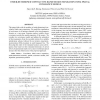Free Online Productivity Tools
i2Speak
i2Symbol
i2OCR
iTex2Img
iWeb2Print
iWeb2Shot
i2Type
iPdf2Split
iPdf2Merge
i2Bopomofo
i2Arabic
i2Style
i2Image
i2PDF
iLatex2Rtf
Sci2ools
ICASSP
2010
IEEE
2010
IEEE
Under-determined convolutive blind source separation using spatial covariance models
This paper deals with the problem of under-determined convolutive blind source separation. We model the contribution of each source to all mixture channels in the time-frequency domain as a zero-mean Gaussian random variable whose covariance encodes the spatial properties of the source. We consider two covariance models and address the estimation of their parameters from the recorded mixture by a suitable initialization scheme followed by an iterative expectationmaximization (EM) procedure in each frequency bin. We then align the order of the estimated sources across all frequency bins based on their estimated directions of arrival (DOA). Experimental results over a stereo reverberant speech mixture show the effectiveness of the proposed approach.
Blind Source Separation | Gaussian Random Variable | ICASSP 2010 | Signal Processing | Suitable Initialization Scheme |
Related Content
| Added | 06 Dec 2010 |
| Updated | 06 Dec 2010 |
| Type | Conference |
| Year | 2010 |
| Where | ICASSP |
| Authors | Ngoc Q. K. Duong, Emmanuel Vincent, Rémi Gribonval |
Comments (0)

